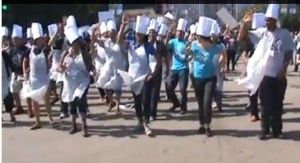Union ‘mercenary’ group enters Seattle minimum wage debate

ROC-ING ALONG: During a 2011 meeting of the National Restaurant Association in Chicago, ROC organized a “flash mob” to protest.
By Dustin Hurst | Washington State Watchdog
As Seattle and its leaders contemplate raising the minimum wage to $15 per hour, a group that one critic dubs a “union mercenary” has entered the fray.
The Olympia-based Freedom Foundation revealed last week that the Restaurant Opportunities Center, a federally registered nonprofit organization based in New York City, is conducting surveys in the Seattle area, a sign the group is about to enter the battle over the higher wage proposal.
ROC isn’t a labor union, but that doesn’t mean it doesn’t have nearly identical goals as organized labor. ROC poses as a pro-worker, anti-corporation group that seeks workplace justice.
Mike Paranzino, communications director for ROC Exposed, told Watchdog.org that Seattle residents — and Washingtonians in general — should be leery of ROC’s presence on the ideological battlefield.
“Washingtonians should worry that ROC, a union mercenary, is bringing its bullying and misrepresentations to the Evergreen State,” Paranzino told Watchdog.org. “ROC also means phony, agenda-driven press releases dressed up as research.”
Additionally, Paranzino said, ROC serves the interests of the big labor unions, not restaurant workers.
Teófilo Reyes, a senior director with ROC, refuted the Freedom Foundation’s report, and said his group has no plans to begin ground operations in Seattle to drive up support for a $15-per-hour minimum wage.
“We’re involved in research projects in major markets across the country,” Reyes said.
Reyes lashed out at those who see ROC’s involvement in the Northwest’s Emerald City as undesirable.
“We’re not a union,” he said. “It’s unfortunate that some people see unions as so negative.”
Perhaps the group’s critics bash ROC for its funding sources — taxpayers and groups with partisan agendas.
An August 2013 report by Watchdog.org’s Eric Boehm revealed that ROC is funded — at least in part — with taxpayer cash. Tax filings for ROC United, the parent organization behind the group, reveal the group received $180,000 in government grants in 2010 and another $60,000 in 2011.
ROC also received cash from the left-wing Tides Foundation, which funds myriad liberal and progressive groups across the country.
Tides, by the way, also receives large amounts of cash from government coffers.
Perhaps ROC’s critics also focus on the group’s hypocrisy on wages. Boehm also revealed last year that some of the organization’s former employees sued the group for — wait for it — failing to pay them.
From Boehm’s article:
In a lawsuit filed in U.S. District Court in New York, eight former employees of the Restaurant Opportunity Centers United alleged they were abused and exploited by the organization. The 2007 lawsuit, though ultimately unsuccessful, sought back pay and other compensation from the organization.
The lawsuit was dismissed in 2007 because a federal judge ruled the plaintiffs didn’t meet the legal definition of being employees.
ROC also struggles, on occasion, with the truth. The group and its founder, Saru Jayaraman, regularly tell anyone who will listen that restaurant workers make only $2.13 an hour. On the telephone last week, Reyes tried the same thing.
“They have the lowest pay in the country,” Reyes said of restaurant workers. “That’s from BLS (Bureau of Labor Statistics) data.”
ROC Exposed refutes that claim, noting the real numbers show restaurant workers make about $13 an hour.
ROC’s voice, though, will add to a chorus of left-wing groups attempting to seize momentum after SeaTac, a tiny suburb of Seattle, approved a $15-per-hour minimum wage last year. This year, those activists have their sights set on Seattle, the grand prize of the Inland Northwest.
Seattle Mayor Ed Murray backs the $15-per-hour minimum wage idea, as does Councilmember Kshama Sawant, an avowed socialist.
Murray formed a committee to study the wage proposal.
Paranzino told Watchdog.org that following the plan could be catastrophic, especially for the least educated of Seattle’s workforce.
“A $15 push would just worsen the loss of jobs,” he wrote in an email. “College graduates will be OK. It is those with a high school diploma or less who would be hammered by the job loss.”
Max Nelson, the Freedom Foundation’s labor policy analyst, said Seattle and Washington quickly are becoming a battlefront for big labor and its allies.
“They probably figure that this is a safe place to test out some of their extreme ideas,” Nelson said.
On ROC, Nelson said the group has an “over-the-top” history in union activism.
Paranzino echoed that sentiment.
“ROC is bad news for the unemployed, for workers and for job creators throughout Washington, especially for mom and pop restaurants and stores,” he said.
Contact Dustin Hurst at Dustin@Watchdog.org.







